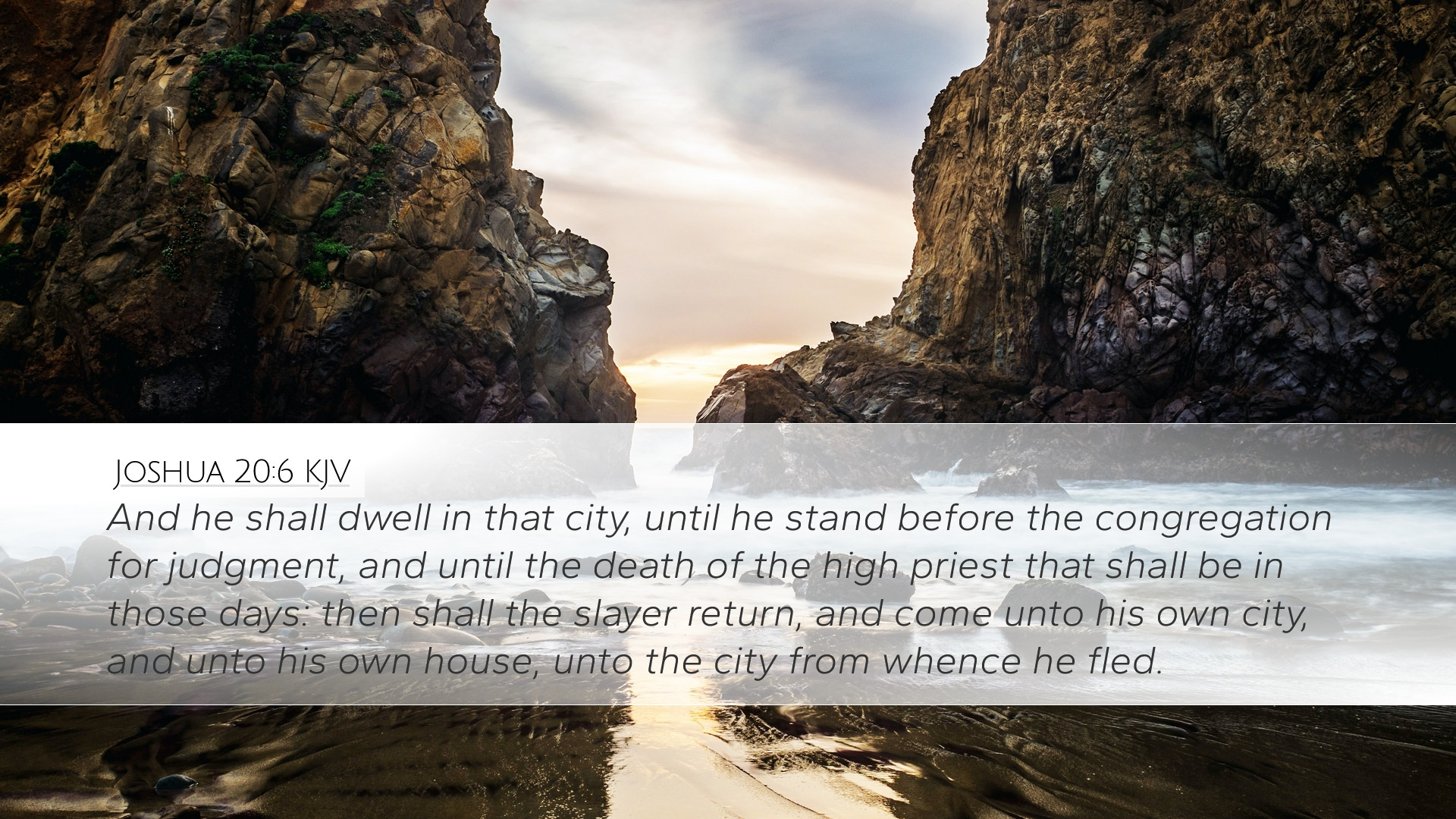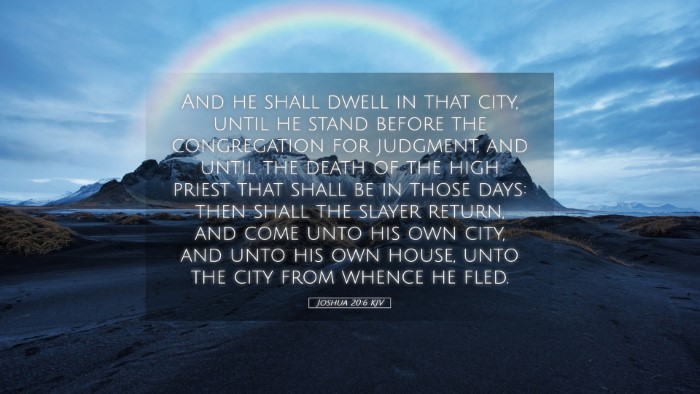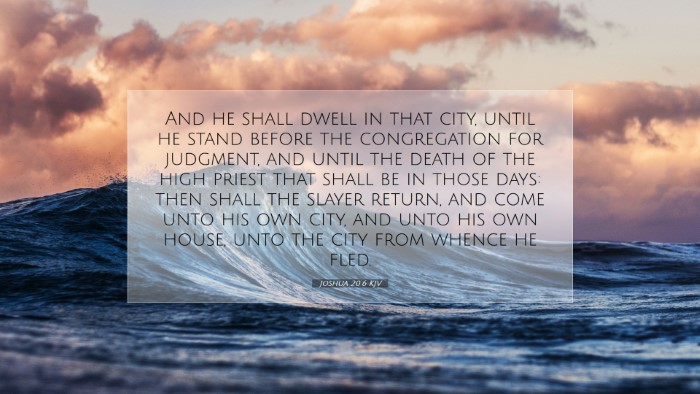Old Testament
Genesis Exodus Leviticus Numbers Deuteronomy Joshua Judges Ruth 1 Samuel 2 Samuel 1 Kings 2 Kings 1 Chronicles 2 Chronicles Ezra Nehemiah Esther Job Psalms Proverbs Ecclesiastes Song of Solomon Isaiah Jeremiah Lamentations Ezekiel Daniel Hosea Joel Amos Obadiah Jonah Micah Nahum Habakkuk Zephaniah Haggai Zechariah MalachiJoshua 20:6
Joshua 20:6 KJV
And he shall dwell in that city, until he stand before the congregation for judgment, and until the death of the high priest that shall be in those days: then shall the slayer return, and come unto his own city, and unto his own house, unto the city from whence he fled.
Joshua 20:6 Bible Commentary
Commentary on Joshua 20:6
Text of Joshua 20:6 (KJV): "And he shall dwell in that city, until he stand before the congregation for judgment, and until the death of the high priest that shall be in those days: then shall the slayer return, and come unto his own city, and unto his own house, unto the city from whence he fled."
Introduction
This passage addresses the function and significance of the cities of refuge established by God for those who have unintentionally committed manslaughter. The insightful commentaries of Matthew Henry, Albert Barnes, and Adam Clarke together provide a comprehensive understanding of the theological implications and practical applications of this text.
Contextual Background
The book of Joshua, which recounts the Israelites' conquest and settlement in Canaan, outlines God’s instructions for the establishment of cities of refuge. Joshua 20 serves as a pivotal point, emphasizing the divine justice and mercy that govern God’s law.
Purpose of Cities of Refuge
- Protection: These cities offered sanctuary to those who accidentally caused death, contrasting with the harsh realities of ancient retribution.
- Judicial Framework: They established a system for adjudicating cases of manslaughter, ensuring that justice was administered fairly.
- Theological Significance: The cities symbolize God's provision for mercy amidst justice, offering a refuge for the remorseful sinner.
Matthew Henry’s Insights
Matthew Henry emphasizes the mercy of God in providing these cities of refuge as a means of preserving life, even in cases of unintentional wrongdoing. He notes that the mention of the High Priest underscores the connection between the act of grace shown to the fugitive and the broader themes of intercession and atonement found in the priesthood. The High Priest serves as a mediator, and his death represents a pivotal moment in the life of the fugitive, symbolizing the completion of justice and the possibility of return.
Albert Barnes’ Commentary
Albert Barnes elaborates on the social and legal implications of this verse. He observes that the command to dwell in the city until the death of the High Priest emphasizes the need for a controlled response to sin. The slayer's residence in the city was not a mere punishment but a shield against vengeance, a period of reflection and reconciliation with the community. Barnes also links this practice to the notion of Christ as our ultimate refuge, echoing the New Testament themes of grace and restoration.
Adam Clarke’s Observations
Adam Clarke discusses the longevity of the High Priest’s role in relation to the slayer. He notes that the death of the High Priest is a significant event that allows for the return of the individual back to his homeland, signifying forgiveness and restoration. Clarke emphasizes the vital role of the High Priest as a figure of authority and compassion, which reflects God's character and His desire for reconciliation with His people. He also comments on the spiritual implications of this verse, advocating that believers should find refuge in Christ, our eternal High Priest who remains forever accessible to us.
Theological Implications
Joshua 20:6 is rich in theological implications, highlighting key concepts of justice, mercy, and atonement. It teaches that:
- The Nature of Sin: Sin, even when unintentional, carries consequences that require acknowledgment and processing.
- God's Mercy: The provision of cities of refuge indicates God's desire to protect and redeem sinners.
- Role of Intercession: The death of the High Priest foreshadows the ultimate sacrifice of Christ, who intercedes for humanity.
Practical Applications
This verse has profound implications for contemporary believers:
- Seeking Sanctuary: Just as the cities offered physical refuge, Jesus offers spiritual refuge for all who come to Him.
- Understanding Grace: Believers are reminded of God’s grace in their lives, calling them to extend grace to others.
- Community Responsibility: Churches today must provide a space of healing and support for those who feel estranged due to sin.
Conclusion
Joshua 20:6 serves as a theological cornerstone that articulates God’s intricate balance of justice and mercy. It reminds us of the loving provision God has made for the unintentional sinner and points forward to the ultimate fulfillment of these principles in Jesus Christ, our High Priest. The commentaries of Henry, Barnes, and Clarke facilitate a deeper understanding of this text, encouraging believers to embrace the refuge that God offers and the responsibilities that come with it.


